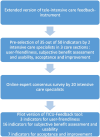TICU-Feedback-Tool: development and pilot application of a questionnaire to assess performance in tele-intensive care collaborations
- PMID: 40114148
- PMCID: PMC11924688
- DOI: 10.1186/s12913-025-12565-4
TICU-Feedback-Tool: development and pilot application of a questionnaire to assess performance in tele-intensive care collaborations
Abstract
Background: Telemedicine is a suitable vehicle to facilitate collaboration among hospitals across borders, with the COVID-19 pandemic paving the way for rapidly growing tele-intensive care (TICU) networks, aiming to improve quality of care. Hitherto there are no validated instruments to assess and evaluate performance in international TICU collaboration.
Methods: We conducted a prospective, structured survey development study with a single-step online expert consensus approach and a pilot application.
Results: We propose a 26-indicator TICU-Feedback-Tool assessing user-friendliness, subjective benefit and usability, acceptance and potential for improvement in TICU networks. The instrument is suitable for self-reporting by online questionnaire.
Conclusion: We suggest a pilot version of a feedback questionnaire for quality management in (inter-)national TICU networks that will be subject to revisions in the future.
Keywords: Feedback; Intensive care unit; Quality; Telemedicine.
© 2025. The Author(s).
Conflict of interest statement
Declarations. Ethics approval and consent to participate: The study was approved by the local ethics committee of Charité – Universitätsmedizin Berlin (registered under No. EA2/163/23). Informed consent to participate was obtained from all of the participants in this study prior to participation. The study was conducted in compliance with the Declaration of Helsinki. Consent for publication: Not applicable. Competing interests: The authors declare no competing interests.
Similar articles
-
Tele-Critical Care Support Outside the Intensive Care Unit.Crit Care Clin. 2024 Jul;40(3):599-608. doi: 10.1016/j.ccc.2024.03.012. Epub 2024 Apr 25. Crit Care Clin. 2024. PMID: 38796230 Review.
-
Keeping the sickest patients safer: telemedicine and critical care.J Contin Educ Nurs. 2012 Dec;43(12):537-8. doi: 10.3928/00220124-20121120-94. J Contin Educ Nurs. 2012. PMID: 23181404
-
Trauma intensive care unit (TICU) at Hamad General Hospital.Qatar Med J. 2020 Feb 6;2019(2):5. doi: 10.5339/qmj.2019.qccc.5. eCollection 2019. Qatar Med J. 2020. PMID: 32076594 Free PMC article.
-
User Experience of a Bespoke Videoconferencing System for Web-Based Family Visitation for Patients in an Intensive Care Unit: 1-Year Cross-Sectional Survey of Nursing Staff.JMIR Hum Factors. 2025 Mar 21;12:e54560. doi: 10.2196/54560. JMIR Hum Factors. 2025. PMID: 40116766 Free PMC article.
-
Implementation of Tele-Intensive Care Unit Services During the COVID-19 Pandemic: A Systematic Literature Review and Updated Experience from Shandong Province.Telemed J E Health. 2023 May;29(5):646-656. doi: 10.1089/tmj.2022.0302. Epub 2022 Oct 11. Telemed J E Health. 2023. PMID: 36251955
References
-
- Sauers-Ford HS, Marcin JP, Underwood MA, Kim JH, Nicolau Y, Uy C, et al. The use of telemedicine to address disparities in access to specialist care for neonates. Telemed J E Health. 2019;25(9):775–80. - PubMed
-
- Boots RJ, Singh S, Terblanche M, Widdicombe N, Lipman J. Remote care by telemedicine in the ICU: many models of care can be effective. Curr Opin Crit Care. 2011;17(6):634–40. - PubMed
-
- Sinvani L, Delle Site C, Laumenede T, Patel V, Ardito S, Ilyas A, et al. Improving delirium detection in intensive care units: multicomponent education and training program. J Am Geriatr Soc. 2021;69(11):3249–57. - PubMed
MeSH terms
LinkOut - more resources
Full Text Sources
Medical


